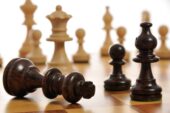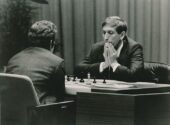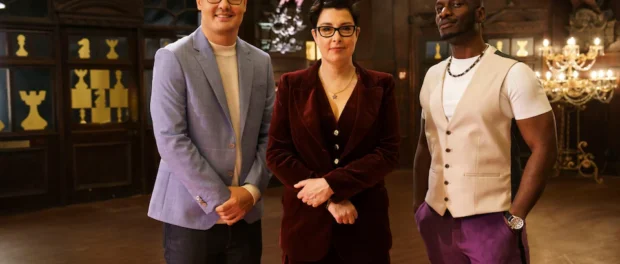Endgame/BBC 2
After a few years it was good to see chess back on our screens. The format of Endgame was a series of lightning chess matches (known as blitzes) between contestants. One of them – known as the Swashbuckler – had discovered chess in prison and was a better talker than player.
David Howell, an ex-Grandmaster and chess coach Anthony Mathurin – who looked and talked like the runner Chris Akebusi – provided the expert analysis, whilst Sue Perkins presented.
 There were two main problems: firstly, you could not follow any single match because the programme only lasted 30 minutes; and, secondly, to whom do you pitch the programme: the novice, the club player or the enthusiast?
There were two main problems: firstly, you could not follow any single match because the programme only lasted 30 minutes; and, secondly, to whom do you pitch the programme: the novice, the club player or the enthusiast?
 In this case, probably the latter.
In this case, probably the latter.
Most people learn chess at school and that’s it.
Even if you are an outstanding player you are unlikely to make a living from it though it might help vocationally if you are a strategic thinker.
 Chess goes through periods of popularity.
Chess goes through periods of popularity.
The last ‘vehicle’ was the excellent series The Queen’s Gambit modelled on the equally-excellent book by Walter Nevis.
It featured a female prodigy – Beth Herman – well played by Anya Taylor-Joy.
 The last World Championship to really ‘catch on’ was way back in 1974, that between Bobby Fischer and Boris Spassky, who died recently.
The last World Championship to really ‘catch on’ was way back in 1974, that between Bobby Fischer and Boris Spassky, who died recently.
The curmudgeonly Fischer, who objected to the playing conditions, was the right person to destroy the hegemony of Soviet chess.
 I once sent a chess programme proposal to a friend at the BBC. My idea was a series of matches between chess players well-known in other fields, e.g. boxer Lennox Lewis, snooker player Steve Davis and footballer Ossie Ardiles, all of them keen players; Dominic Lawson regularly turns out for the MCC and – in the past – Humphrey Bogart was a keen player, as was the financier Jim Slater.
I once sent a chess programme proposal to a friend at the BBC. My idea was a series of matches between chess players well-known in other fields, e.g. boxer Lennox Lewis, snooker player Steve Davis and footballer Ossie Ardiles, all of them keen players; Dominic Lawson regularly turns out for the MCC and – in the past – Humphrey Bogart was a keen player, as was the financier Jim Slater.
It’s possible that Endgame might rekindle an interest, but I doubt it.

